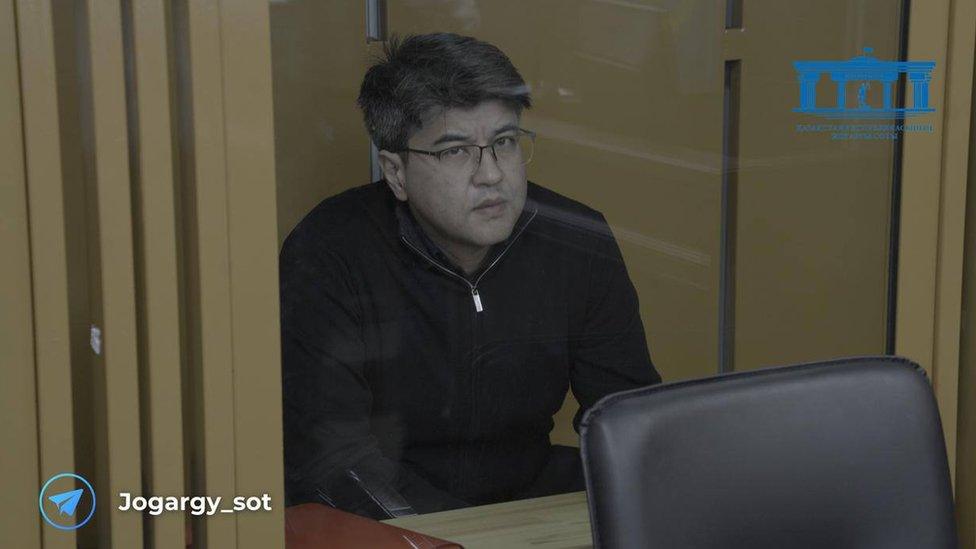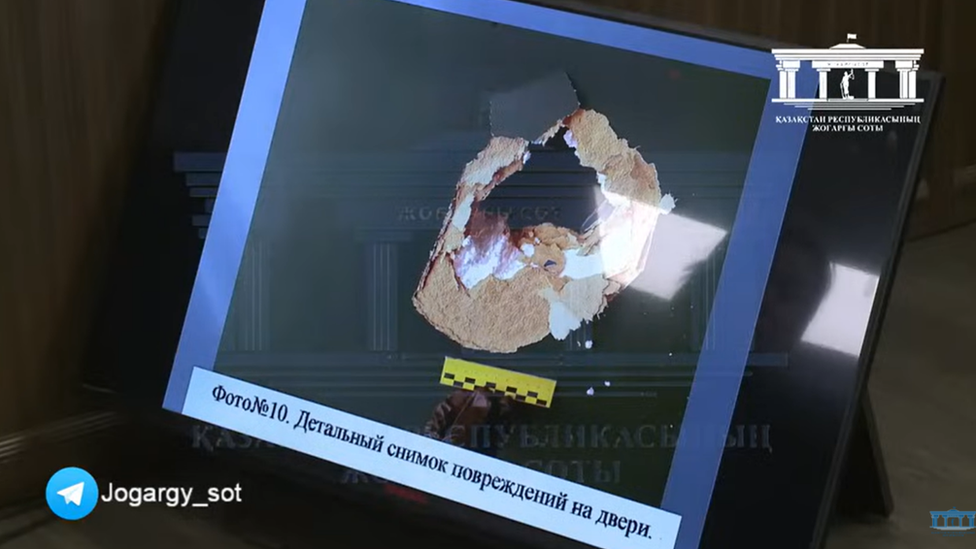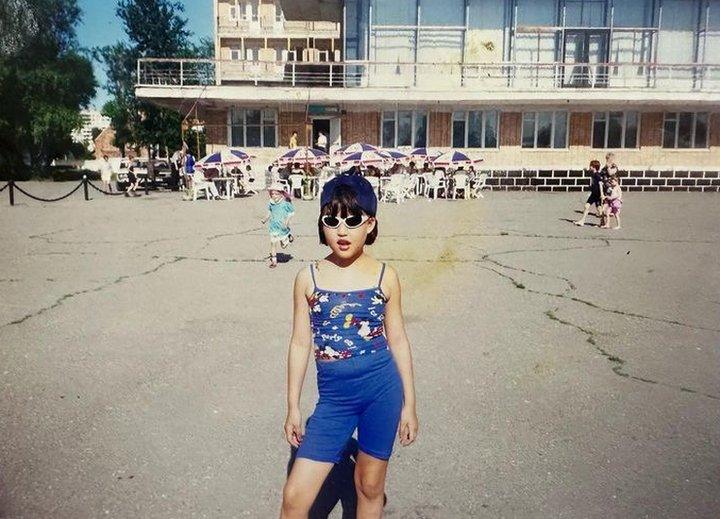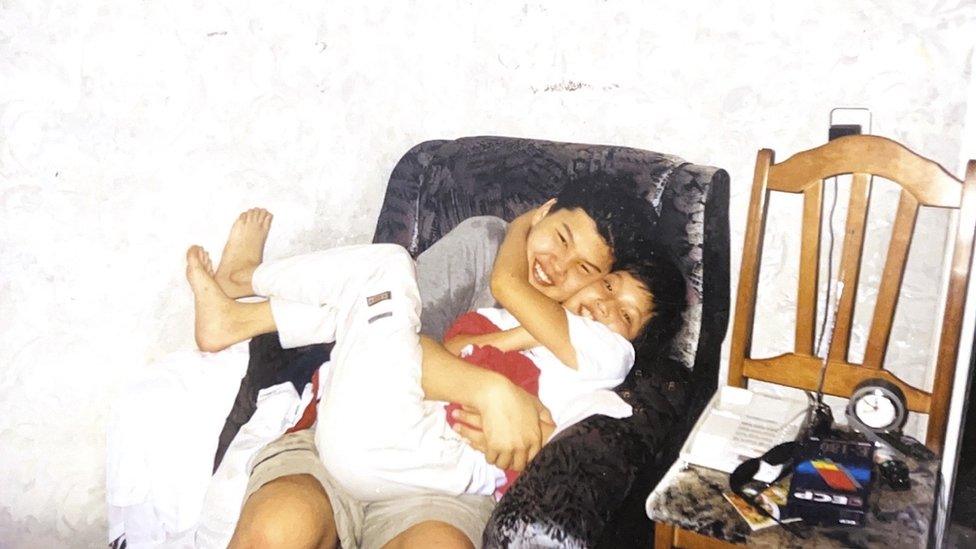Saltanat Nukenova: The politician, the astrologer and a murder that could change Kazakhstan
- Published

Saltanat Nukenova had been married to Kuandyk Bishimbayev for less than a year when he killed her
A high profile murder trial of a former government minister in Kazakhstan has been followed by millions and shone a spotlight on the country's domestic violence problem. After a landmark sentence saw a once powerful politician held to account for his wife's murder, and a new law brought in, it has raised the question about whether there could be justice for other victims.
WARNING: This article contains details of violence against women.
The facts, as laid out by the court, were horrifying.
The country's former economy minister had beaten Saltanat Nukenova to death in an assault that was partly in plain view of CCTV cameras.

Just after 07:15 local time, footage from a restaurant in the capital Astana captured Kuandyk Bishimbayev hitting and kicking Saltanat, and dragging her by the hair.
Exactly what happened over the next 12 hours is less clear. Some of it was captured on his own mobile phone - footage shown to the court, but not the public.
Audio captures Bishimbayev insulting Saltanat and questioning her about another man. The court heard Bishimbayev rang a fortune teller several times, as his wife lay unconscious in the VIP room - where there were no cameras.
An ambulance was finally called just before 20:00. She was already dead - and potentially had been for as long as six to eight hours, according to the post-mortem examination.
The forensic examination, detailed in court, reported that Saltanat sustained a brain injury from external bruises, abrasions and wounds; 230 millilitres of blood had collected between her skull and surface of the brain. There were signs of strangulation, the court was told.

Photo shown in court from the scene shows a hole in a toilet door, allegedly caused by Bishimbayev
Bishimbayev's relative, Bakhytzhan Baizhanov, the director of the food court complex where the restaurant was located, was sentenced to four years in prison for concealing a crime. He claimed during the trial that Bishimbayev asked him to delete surveillance footage.
On 13 May the Supreme Court in Astana sentenced Kuandyk Bishimbayev, 44, to 24 years in prison for the murder of Saltanat Nukenova, 31.
But in Kazakhstan - where hundreds of women die at the hands of their partners each year - securing a conviction wasn't a given. Aggressors are brought to justice in only one in four domestic violence cases in the country, the UN estimates, external.
Many women remain too scared to come forward.
As Saltanat's brother says, Kazakh women have been "screaming before, but they've never been heard".
Until now.


Saltanat Nukenova at the Port of Pavlodar, Kazakhstan (1996-1997)
Saltanat's childhood was spent in the north-east city of Pavlodar - close to Kazakhstan's border with Russia.
After finishing school, she moved to the former capital Almaty - where she lived for a short period with her older brother and only sibling, Aitbek Amangeldy. "That time was precious in terms of our relationship", said Aitbek, detailing how he and his sister developed a close relationship into adulthood.
Saltanat Nukenova had been married to Kuandyk Bishimbayev for less than a year when he killed her.
According to reports, he was arrested in 2017 on bribery charges and eventually sentenced to 10 years - released after spending less than three years behind bars.
At this time, Saltanat was working as an astrologer, a passion which had started after her godmother gifted her a book when she was nine, her brother said.
"She provided help to women who were in different type of difficult stations - whether that's a relationship within family, or problems in the marriage, with children," he explained, as he recalled his cheerful, smiling sister and her dreams of opening a school of astrology.

Aitbek Amangeldy and Saltanat Nukenova in Pavlodar, Kazakhstan (1996-1997)
In his testimony, Aitbek said Bishimbayev tried to make an appointment with Saltanat, who initially refused the request.
He said a "long, obsessive courtship" followed, and Bishimbayev managed to get Saltanat's phone number. Aitbek said his sister showed him messages, where Bishimbayev had asked to meet and encouraged her to not believe everything written and said about him.
Within months of that meeting, they had married. And it didn't take long for the issues to start.
Saltanat shared pictures of bruising with her brother and tried to leave her husband on several occasions. He suggested Bishimbayev was trying to isolate her - after Saltanat stopped working in the job she loved, as he "forbade" her from working.
It was, the judge told the court as she sentenced Bishimbayev, a killing with particular cruelty.
And yet Bishimbayev had sought to downplay it. He admitted causing bodily harm to Saltanat that led to her death, but firmly denied that it was intentional.
He called on the jury to be "objective and fair".
His lawyer, meanwhile, asked her brother Aitbek whether Saltanat preferred "men to dominate" in relationships - or whether she dominated.
"Are you serious?" he responded.
A courageous act
The tenor of questioning does not surprise Denis Krivosheev, Amnesty International's deputy director for Eastern Europe and Central Asia.
"The survivor may be blamed for behaving in some way which 'provokes' the offender; she may be blamed for destroying the family, for disrespecting her husband, or the parents and in-laws," he told the BBC.
"It takes courage to report domestic violence, and there is every reason to believe that it is very much under-reported."
The United Nations has estimated that around 400 Kazakh women are killed in domestic violence each year. In comparison, 70 women were killed in England and Wales - with a population three times larger - in the year to March 2023.
Calls to crisis centres for victims of domestic violence increased by 141.8% between 2018 and 2022, according to the Kazakh ministry of internal affairs.
Even so, Mr Krivosheev says there is "still a high level of tolerance to domestic violence, but it is coming down".
But as details of Saltanat's final hours were exposed to the nation via a live stream from the courtroom, pressure mounted on the government to act. Social media users took to platforms such as TikTok to talk about the case. And a petition, signed by more than 150,000 people, demanded reform in the law on domestic violence.
On 15 April, President Kassym-Jomart Tokayev signed into law, external a bill that toughened the punishment for domestic violence - after it had been decriminalised in 2017. The new "Saltanat's law" makes it a criminal offence; it was previously deemed a civil offence. Cases can now also be opened without a victim's own report.
But the reality is, it still falls far short of what is needed, says Dinara Smailova - who founded the NeMolchiKZ Foundation, which helps victims of domestic violence and rape.
For a start, "harm is considered as slight" if a woman does not stay in hospital for at least 21 days; "Fractures, a broken nose and jaw are assessed as minor harm to health".
Ms Smailova established her foundation after posting on social media in 2016 about surviving gang rape and sexual violence in her youth, and seeing the response. She said in the space of a few days, she received "about a hundred messages from women who talked about the violence they experienced, how they were forbidden to speak and how men went unpunished".
Her foundation has been publishing "shocking cases of violence for eight years", without a response from the government, she added. She herself no longer lives in Kazakhstan, where she has been put on a wanted list by the authorities for spreading false information, violating privacy and fraud, external.
Ironically, it is stories like these which would have inspired Saltanat's compassion.
"She was always fighting for the justice," says Aitbek. "It doesn't matter in terms of what… so she had a strong feeling for justice. Whenever she saw that someone is hurt and that he needs protection, she was always there" for people.
And yes, he says, the law does not go far enough - yet. But it is a start, showing people that even the most powerful can be held to account.
This trial will show people that "in Kazakhstan, a law is the same for everyone and everyone is equal from the law in front of the trial," he said.


